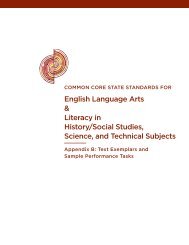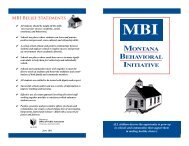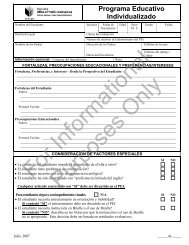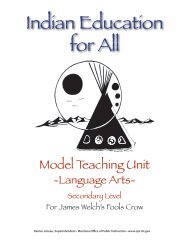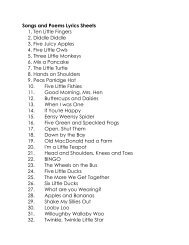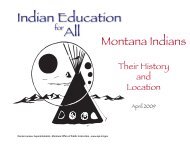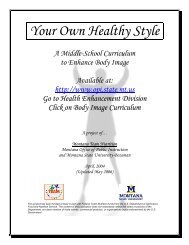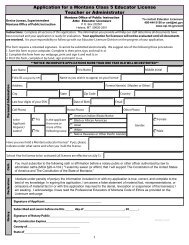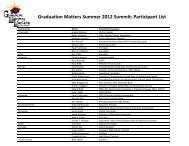OT/PT Guidelines - Montana Office of Public Instruction
OT/PT Guidelines - Montana Office of Public Instruction
OT/PT Guidelines - Montana Office of Public Instruction
You also want an ePaper? Increase the reach of your titles
YUMPU automatically turns print PDFs into web optimized ePapers that Google loves.
The American Journal <strong>of</strong> Occupational Therapy (www.ajot.org) provides an online link<br />
searching past issues to locate research articles related to practice. The Journal <strong>of</strong> the<br />
American Physical Therapy Association (www.ptjournal.org) provides similar information<br />
and links to current, as well as past, research. The National Center for Biomedical Information<br />
(www.ncbi.nlm.nih.gov) provides a large amount <strong>of</strong> research on a number <strong>of</strong> topics for every<br />
area <strong>of</strong> the medical field. This site provides links to PubMed; however, many <strong>of</strong> these articles<br />
can only be accessed from centers that pay to provide access to these articles.<br />
For pr<strong>of</strong>essionals in practice, it is sometimes challenging to locate appropriate pr<strong>of</strong>essional<br />
literature and then interpret the findings <strong>of</strong> the studies to decide if the results are applicable in<br />
practice situations. One user-friendly resource is the following Web Site:<br />
www.researchtopractice.info/sitemap.php. Look for the Bottomlines and Bridges documents,<br />
which cover a range <strong>of</strong> topics and provide guidance about best practices:<br />
References<br />
• Bottomlines provides a one-page summary-review <strong>of</strong> the literature on topics<br />
specifically related to serving children and families. These are helpful for both<br />
pr<strong>of</strong>essionals and parents.<br />
• Bridges provides full-reviews <strong>of</strong> the literature for those desiring to read the details.<br />
McWilliam (1999) provides guidance about how to evaluate emerging and controversial<br />
practices. Reading this article will be useful:<br />
• McWilliam, R. A. (1999). Controversial Practices: the need for a reacculturation <strong>of</strong><br />
early intervention fields. Topics in Early Childhood Special Education,19:3, p. 177-<br />
188.<br />
34. What are some promising practices that would reflect evidence-based practices?<br />
As required in IDEA 2004, special education service providers (including <strong>OT</strong>s and <strong>PT</strong>s) are<br />
required to use peer-reviewed, research-based practices, which are a component <strong>of</strong> evidencebased<br />
practices. The following information is provided only as a starting point and should not<br />
be considered exhaustive <strong>of</strong> topics or resources:<br />
Evidence suggests that consultation is an effective intervention method. Below are some<br />
examples:<br />
Dunn, W. (1990). A comparison <strong>of</strong> service provision models in school-based occupational<br />
therapy services: A pilot study. Occupational Therapy Journal <strong>of</strong> Research, 10(5), 300-320.<br />
Kemmis, B. L., & Dunn, W. (1996). Collaborative consultation: The efficacy <strong>of</strong> remedial and<br />
compensatory interventions in school contexts. American Journal <strong>of</strong> Occupational Therapy,<br />
50(9), 709-717.<br />
34



